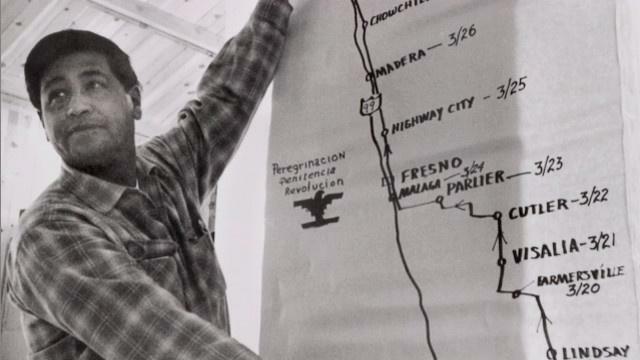Women of the Farmworkers' Movement
Starting in 2020, the last week of March has been designated "National Farmworker Awareness Week" to raise awareness about farmworkers' working conditions and to recognize their contributions. March 25 to 31 is a time to appreciate what it really takes to get food on our plates and honor the people who do this truly essential work. Because it's also the end of Women's History Month, here are 5 documentaries about women who have worked toward justice for farmworkers and agricultural laborers. Learn more about Maria Moreno, Dolores Huerta, Monica Ramirez, Jessie de la Cruz, and Emma Tenayuca.
Maria Moreno
Maria Moreno (October 22, 1920 – July 9, 1988) was a Texas-born farmworker and labor organizer. She was the first woman farmworker hired to be as a union representative, for the Agricultural Workers Organizing Committee (AWOC), in 1959. Her activism began after floods devastated crops and stopped farm work. Families struggled to survive as a result, yet government denied food assistance for farmworkers.
She was known to be outspoken and her positive impact on the labor movement might have been forgotten if not for her 12 children and a discovery of old photographs keeping her story alive. The photographs led to the making of the 2019 VOCES documentary: Adios Amor: The Search for Maria Moreno.
Hear her voice, know her story and how she changed the farmworkers' movement. The full documentary is available to stream on PBS.org and on the PBS app. You can also learn more about the film from filmmaker Laurie Coyle at http://www.adiosamorfilm.com.
Dolores Huerta
Dolores Huerta was born on April 10, 1930 and has spent nearly her entire life as a labor and civil rights activist. A daughter of farmworkers, she spent years at the forefront of the effort to create the United Farm Workers (UFW) in 1962. She worked right alongside her UFW co-founder Cesar Chavez and Larry Itliong during the strikes, walkouts, and demonstrations 1960s. She has since built on the activism of the farmworkers' movement to become a voice for women's equality and environmental justice.
Did you know that before she was a full-time labor leader she was a grammar school teacher? She taught in Stockton, California, where she saw how the mistreatment and exploitation of farm workers affected their children's educational opportunities.
Peter Bratt's 2018 Independent Lens documentary, "Dolores" tells the story of Dolores Huerta, among the most important, yet least-known, activists in American history. Co-founder of the first farmworkers union with Cesar Chavez, she tirelessly led the fight for racial and labor justice, becoming one of the most defiant feminists of the 20th century.
For The Classroom
Find lesson plans and classroom resources to help students explore the farmworker movement on PBS Learning Media.

Support your local PBS station in our mission to inspire, enrich, and educate.
Monica Ramirez
The daughter and grand-daughter of migrant farmworkers, Monica Ramirez always starts her story with that important fact. She has dedicated her life to seeking justice for the unheard, the overlooked, and the exploited. In 2003 Ramirez created the first legal initiative to address gender discrimination against farmworker women. Building upon that advocacy she founded Justice for Migrant Women, an organization working to advance civil and human rights for migrant women. Ramirez' work is a reminder that the movement began in the 1960s with the formation of the United Farm Workers, but the quest for civil and human rights continues.
In 2019, she was one of the Hispanic Heritage Foundation's honorees at its 32nd annual Hispanic Heritage Awards. She was one of the recipients of the Leadership Award and her acceptance speech (start at 8:38 if you want to listen to her first!) is as inspiring as her work is.

The best of PBS, straight to your inbox.
Be the first to know about what to watch, exclusive previews, and updates from PBS.
Jessie de la Cruz
Jessie de la Cruz was born in Anaheim, California in 1919. She began working in the fields at age 5 along with her family. She continued the work even as she had her children and worked alongside her husband Arnold, who later worked with Cesar Chavez and the National Farm Workers Association (NFWA). Jessie and Arnold hosted organizing meetings in their home and Jessie went on to lead a variety of demonstrations and become a union recruiter. When the NFWA became the United Farm Workers (UFW), Jessie continued to advocate for agricultural workers and to grow opportunities for women in UFW leadership. She retired from UFW in 1993 and continued to help people in her community until her death in 2013.
We remember her work so early in the farmworkers' rights movement. In particular, she often used the phrase, "Hope dies last" to remind all of us that even when things are difficult and dark, we still have hope for a better world.
Emma Tenayuca
Emma Tenayuca (December 12, 1916 - July 23, 1999) was a leader of the labor movement, a woman who risked everything to demand better conditions for Texas pecan shellers, a largely Mexican American workforce in the 1930s. Born and raised in San Antonio, she was just 21 years old when she led the pecan shellers at San Antonio, Texas' Delicious Pecan Company to walk off the job in protest of the meager pay for difficult working conditions. The strike began on January 31, 1938, lasted three months and grew to include almost 12,000 workers, most of whom were women. It was the largest strike in the city's history.
Watch this episode of KLRN's series The Women Who Shaped San Antonio to learn more about the dynamic and brave agricultural labor leader Emma Tenayuca.
